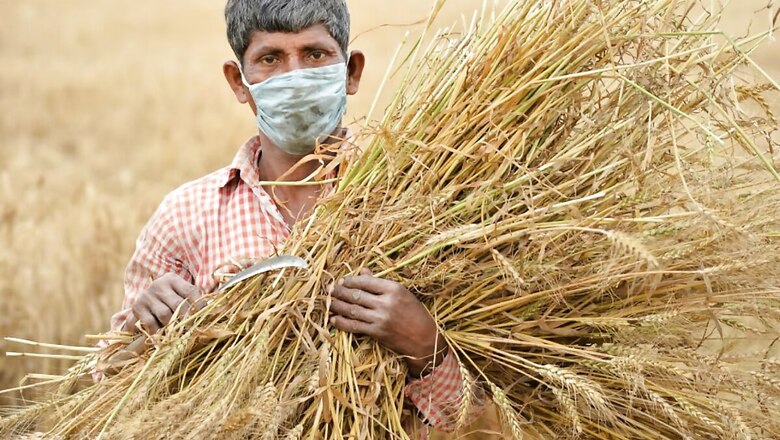
views
The coronavirus pandemic has led to the fall of powerful economies of the world and a massive rise in unemployment rates. As per research by the University of Sydney, the COVID-19 has cost us $3.8 trillion of the global economy and put 147 million people out of work.
According to Eurofer, major economic activities across the European Union have faced a forced shut down, particularly, the manufacturing and automotive sectors from the second half of March until late April/early May, including steel mills.
In its latest Economic Outlook Report (June 2020), the IMF (International Monetary Fund) has predicted an unprecedented global recession of -4.9%, thus reviewing downwards its April forecast (-3%), with the US economy experiencing a recession of -8% and the euro area of -10.2%.
Even during this crisis, there are certain sectors which not only retained their viability but also registered a considerable growth: Agriculture, Health and Education sector.
As per the estimation of Food and Agriculture Organisation (FAO) till 2050, when the world population will touch the mark of 9.1 billion, a substantial increase of 70% of the present production would be required to fulfill the demand of the then the global population.
Food is a permanent need but the issue is, how would the global requirement for food be fulfilled? India has a huge untapped potential in the agriculture sector and can play an instrumental role in fulfilling the global requirement of food.
The recently introduced bills were required in order to tackle various problems prevalent in the agricultural sector. According to FAO, the loss of food per year is around 40% of overall production. Due to lack of proper storage and poor transportation farmers incur a loss of Rs 93,000 crore per year.
Though the food processing industry has registered exponential growth, unfortunately, the condition of farmers is deteriorating gradually. As per National Crime Records Bureau of India, a total of 2,96,438 farmers’ suicides have been reported since 1995. The key reasons behind these suicides were debt, low produce prices, increased cost of cultivation and crop failure. A majority of the small farmers are still not aware of the schemes and not getting benefits from them. Increasing input costs and low output is causing distress among small farmers and keeping them under a constant financial crunch.
To support the financial condition of the farmers the government had introduced the Minimum Support Price (MSP) system, but as of now, only 6% farmers are availing it. Agriculture is still a business of loss as sometimes farmers are not able to recover even their input cost and take loans which lead them to a debt trap. Inadequate storage space, inadequate transport facilities, etc. and a cartel of middlemen is the key reason for making agriculture a non-profitable work for the majority of the farmers. Shrinking profits has made cultivation unviable for many farmers. The fear of price rise kept the political parties away from creating a free trade market for farmers.
In order to reduce the plight of farmers, in 2020, the government has taken some serious steps to address the issue of farmer’s plight. The government introduced three crucial bills (now an Act) for farm reforms which are in great discussion due to many reasons.
These Acts are – The Essential Commodities (Amendment) Act, 2020, the Farmers’ Produce Trade and Commerce (Promotion and Facilitation) Act, 2020, and the Farmers’ (Empowerment and Protection) Agreement on Price Assurance and Farm Services Act, 2020.
According to the government, new laws would benefit farmers by empowering them to decide the price of their produce, to explore the better market and to enter into any agreement for their commercial gains. It will also encourage private investments, infrastructural and technological advancement in this sector and increase competitiveness in the market.
The Farmers’ Produce Trade and Commerce (Facilitation and Promotion) Act, 2020
Agricultural Produce Market Committee (APMC) is a statutory market committee. It is constituted by the state government in respect of trade of certain notified agricultural, horticultural or livestock products, under the Agricultural Produce Market Committee Act issued by that state government.
The purpose of these APMCs or commonly known as ‘Mandis’ was to curb the exploitation of farmers at the hand of intermediaries by prohibiting any direct trade with the farmers and by promoting public-private partnership in the management of the agricultural market i.e. mandi, but instead of protecting farmer’s interest, traders through cartelisation (when all traders fix a price usually below MSP and quote it universally to force the farmer to be a price taker instead of a price maker) forced farmers to sell their products at extremely low prices.
The purpose of this act is to allow intra-state and inter-state trade of farmers’ produce beyond the physical premises of APMC markets. To ensure better market and better pricing for farmers the amendment Act prohibits the state governments from imposing any kind of fee or tax outside APMC areas. The states also have objection over this amendment as they believe this Act encroaches their taxing power and violates the federal structure of the Indian Constitution as APMCs and agriculture are the subject matter of state list.
According to the government of India, this amendment is a step to make India’s agro-sector profitable for farmers by connecting agro-surplus and deficient production zones and encouraging the use of technology for electronic trading for agriculture commodities. It can play an instrumental role in making Indian farmers financially self-reliant. Robust and standardized price discovery mechanisms, online trading platforms, and a virtual agricultural market will help farmers to discover competitive pricing.
On one hand this Act exempts farm produce from the State acts and on other hand free farmers from license and permit raj.
The Farmers’ (Empowerment and Protection) Agreement on Price Assurance and Farm Services Act, 2020
The amended Act talks about contract farming which allows farmers to sell their produce outside of APMCs via a “framework for farmers to enter into direct contracts with those who wish to buy farm produce”.
Overriding all-state APMC laws, the Act gives way to a “farming agreement prior to the production or rearing of any farm produce” with a sponsor.
It highlights that there must be a duration for the agreement between the farmer and the sponsor, like “one crop season, or one production cycle of livestock” with the maximum period being five years. In this agreement, the price of the purchase must also be mentioned.
In the existing APMC system, it is compulsory for farmers to go through a trader in order to sell their produce to consumers and companies. And it is this very system that has given rise to a cartel led by traders and also a non-competitive market for farmers.
This amendment will remove all obstacles in the way of contract farming and will work as a model agreement between farmers and contracting parties. It enables farmers and buyers of their produce to trade outside these tax-free markets and therefore open up APMCs to the competition.
The act seeks to open up the farm sector to more competition, modernize supply chains by enabling bigger agri-businesses to engage with farmers more directly and create seamless access to markets, which are currently fragmented.
It provides for a framework on farming agreements, enabling a farmer to engage with agri-business firms, processors, wholesalers, exporters, or large retailers for the sale of future produce at a mutually pre-agreed price. It provides for a three-level dispute settlement mechanism: the conciliation board, Sub-Divisional Magistrate and Appellate Authority.
These reforms can bring exponential growth in the agriculture sector and can be instrumental in making farmers and our country self-reliant. However, seeing the poor condition of farmers it is important to protect their interests, especially, the way agreements are drafted between farmers and traders. The Dispute Redressal Mechanism should be robust and in a position, to support farmers against powerful investors.
Through these reforms, the government has tried to make the agriculture sector profitable by removing hurdles and providing access to the farmers across the country to sell their product. Results will be awaited to see the market response towards this liberalisation of the agro-sector.
Read all the Latest News and Breaking News here
















Comments
0 comment